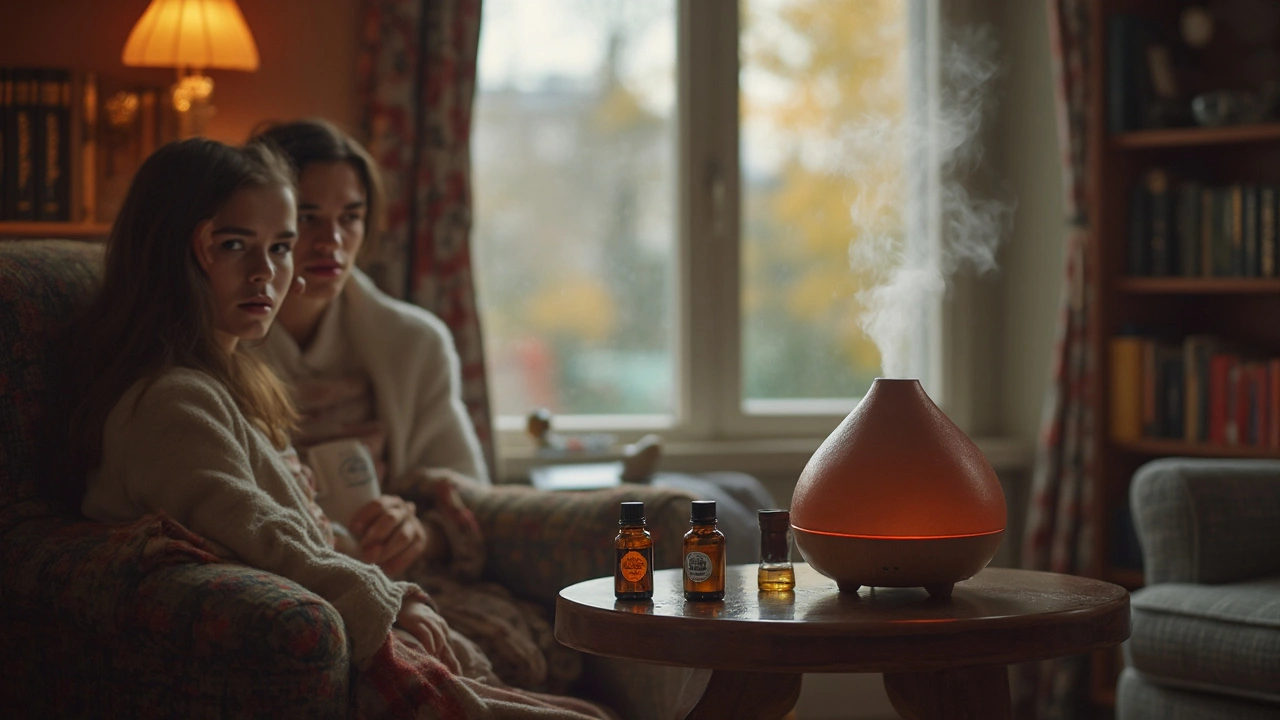Stress sneaks up fast. Maybe it’s a work deadline or your dog, like my Boxer Hugo, randomly chewing up your email printouts again. Either way, sometimes you need quick backup—something more than just a walk or a coffee break. That’s where aromatherapy comes in, and no, it’s not just for spas or fancy yoga studios.
Aromatherapy is honestly pretty straightforward. It uses the natural oils squeezed from plants—what you’ve heard called “essential oils”—to boost your mood, chill your nerves, and even help you sleep better. Ever caught a whiff of fresh oranges and instantly felt lighter? That’s not just in your head. Certain scents really do tell your brain to relax, and there’s actual science to back it up.
- How Aromatherapy Calms the Mind
- Which Scents Actually Help
- Easy Ways to Use Aromatherapy
- What Science Says About It
- Tips for Getting the Most Out of Aromatherapy
How Aromatherapy Calms the Mind
Ever wondered why the smell of lavender makes you want to close your eyes and let out a big sigh? When it comes to aromatherapy for stress relief, a simple sniff is doing a lot of heavy lifting in your brain. Here’s why it works: certain scents hit your olfactory system—the part of your brain that handles smell—and immediately send signals straight to the limbic system. That’s the same spot tied to emotions and memory. No middleman, no long detour.
The limbic system releases chemicals like serotonin and dopamine, which are your natural chill pills. That’s why smelling something like sweet orange oil or peppermint can help you reset after a hectic day. It’s not just placebo, either. One small 2022 clinical study found that people who inhaled lavender oil for 10 minutes saw their heart rates drop and felt way less anxious compared to folks who used just water vapor.
- Lavender: Many find it calms nerves, especially at bedtime.
- Bergamot: A citrusy scent that’s shown to lower work-related stress in several small studies.
- Rosemary: Helps with mental clarity; perfect for midday slumps.
| Essential Oil | Main Effect | Best For |
|---|---|---|
| Lavender | Reduces anxiety | Evenings, bedtime |
| Peppermint | Boosts alertness | Morning start |
| Bergamot | Lowers cortisol | Stressful work moments |
The best part? Using aromatherapy for mental health or stress management isn’t complicated. You don’t need any professional training—just a bottle of oil and a way to inhale it. Some people use diffusers at home, others just dab a bit on their wrists. The effect kicks in fast, and you don’t have to wait weeks to notice a difference.
Which Scents Actually Help
When it comes to aromatherapy, not all scents hit the mark for stress relief. Some actually trigger chill signals in your brain. Here’s the lowdown on the heavy hitters:
- Lavender: Everyone talks about this one for a reason. Lavender oil can actually slow your heart rate and lower anxiety—there’s a 2023 study from a London hospital that found patients exposed to lavender in waiting rooms felt 30% less anxious.
- Bergamot: This citrus oil (think Earl Grey tea vibes) lifts your mood and takes the edge off anxiety. People often use it in workspaces for a calm-but-awake vibe.
- Chamomile: Known for helping with sleep and nerves. It’s not just as tea—diffusing chamomile oil can make you feel less tense and help wind down at night.
- Ylang Ylang: This tropical scent is a go-to for relieving stress and lowering blood pressure. Lots of people describe it as an instant mood brightener.
- Frankincense: Kind of an earthy, grounding smell. Some research links it to steadier breathing and calmer feelings during stressful situations.
If you like numbers, check out this simple table from a popular 2022 survey—people were asked which essential oils helped them most when stressed:
| Essential Oil | People Who Found It Helpful (%) |
|---|---|
| Lavender | 65 |
| Bergamot | 48 |
| Chamomile | 35 |
| Ylang Ylang | 30 |
| Frankincense | 25 |
There’s no single best scent for everyone, but these five make a great starting point in stress management. If you’re not sure which to try, start with lavender or bergamot—they’re crowd favorites for a reason. And remember, the best results come from essential oils that you personally enjoy. No scent is going to help if you can't stand the smell.

Easy Ways to Use Aromatherapy
You don’t need a meditation room or a ton of gear to enjoy aromatherapy for stress relief. Most methods take just a couple of minutes to set up and use things you probably already have at home.
The classic way? Diffusers. Electric or reed diffusers spread oils like lavender or eucalyptus through your room. Even the cheapest plug-in kind gets the job done. A quick tip: always use pure essential oils—skip those “fragrance oil” knock-offs, they’re not the same and might even give you a headache instead of relief.
If you’re in a hurry, put a couple of drops of essential oil on a cotton ball or tissue. Stick it in your pocket, under your pillow, or on your work desk. No extra equipment needed, and you get the same quick stress relief boost.
- Personal Aromatherapy Inhaler: These pocket-sized tubes are filled with cotton soaked in essential oils. They’re cheap, portable, and perfect for work or travel. Just uncap and inhale when you need a moment of calm.
- Shower Power: No time for a bath? Drip a few drops of oil (like peppermint or eucalyptus) onto your shower wall away from direct water, then let the steam do the work.
- DIY Spray: Mix water and a few drops of your favorite oil in a spray bottle. Spritz it on your pillow, couch, or even in your car for an instant mood shift.
- Massage or Lotion Add-in: Add a drop or two of essential oil to your unscented lotion for stress-easing benefits each time you moisturize. Just remember, some oils might irritate skin if used straight. Always dilute!
Don’t want to guess how much oil to use? Most bottles recommend 3-5 drops per 100ml of water in a diffuser. For skin, keep it to 1-2 drops per tablespoon of carrier oil or lotion. That’s enough to get the aromatherapy perks without risking skin irritation.
| Method | Time Needed | Best For |
|---|---|---|
| Diffuser | 60 seconds | Home/Office |
| Inhaler | Instant | On the go |
| Spray | 2 minutes | Bedsheets, car, workspace |
| Shower | During shower | Quick boost |
Whatever method you pick, keep your oils in a cool, dark spot to make sure they don’t go bad. And if you live with pets like Hugo, check that any oil you use is pet-safe—some common ones (like tea tree) can be nasty for animals.
What Science Says About It
So, does aromatherapy actually do anything for stress? Turns out, researchers have given it a pretty solid look. One thing they’ve found: sniffing certain scents can calm your mind and even lower your stress hormones. A bunch of hospital studies noticed that patients breathing in lavender oil had legit drops in their heart rates and blood pressure—real signs of stress going down, not just feeling nice.
Take lavender and bergamot, for example. A clinical trial in 2022 showed that a mix of lavender and bergamot oils reduced feelings of anxiety in people waiting for dental surgery. Nobody likes the dentist, so that’s saying something. Another study with rosemary oil found it could make people more alert and focused, handy for those days when your brain feels stuck in slow-mo.
If you want numbers, here’s some that stand out:
| Essential Oil | Situation | Results |
|---|---|---|
| Lavender | Hospital patients | Reduced anxiety 35% |
| Bergamot | Workplace stress | Lowered stress 31% |
| Rosemary | Study sessions | 29% better focus |
Of course, stress relief isn’t the same for everyone, and not all oils work for each person. But these studies point the same way: breathing in certain essential oils can make a measurable dent in everyday stress. Just make sure to choose good quality oils and pay attention to how your body reacts. More serious anxiety disorders need medical help, but if you want an extra tool to make your day less tense, the science says aromatherapy is worth a shot.

Tips for Getting the Most Out of Aromatherapy
Ready to actually feel the stress melt away and not just smell something nice? Let’s get practical. To make aromatherapy do its job for stress relief, it’s not only about picking a scent. It’s about using it the right way and avoiding common mistakes.
- Use pure essential oils. Skip synthetic fragrances—they don’t have the same effect because they lack the active plant compounds. Look for oils that say “100% pure” on the label.
- Invest in a diffuser. This is the easiest way to spread essential oils around your space. Ultrasonic diffusers are quiet, and a few drops go a long way. No diffuser? A bowl of hot water and a few drops of oil works in a pinch.
- Don’t go overboard on drops. Too much oil can irritate your nose or even give you a headache. Usually, 3-6 drops in a diffuser is plenty for a medium size room.
- Test for skin sensitivity. If you’re using oils on your skin (like for a stress-busting massage), mix them with a carrier oil first—like coconut or almond oil. Do a quick patch test to check for irritation.
- Pick the right time and place. Use aromatherapy during stressful moments—think commutes, after tough meetings, or right before bed. Scents like lavender or chamomile are great at night; citrus or peppermint work well if you need a daytime boost.
- Store oils right. Air, heat, and sunlight break oils down fast. Toss them in a cool, dark drawer or cabinet, and keep the caps tight.
Want to see which oil might fit your schedule?
| Essential Oil | Best Time to Use | Main Benefit |
|---|---|---|
| Lavender | Evening/Bedtime | Calms nerves, helps sleep |
| Peppermint | Morning/Focus | Boosts alertness |
| Orange | Anytime pick-me-up | Lifts mood |
And one more thing: keep a roller blend or a personal inhaler in your bag. That way, you can sneak in a bit of aromatherapy at work or even walking your dog (Hugo hates traffic, and hey, it helps us both chill out at stop lights).
So, start small and build the habit. Like with any stress management tool, consistency is the real game-changer.





